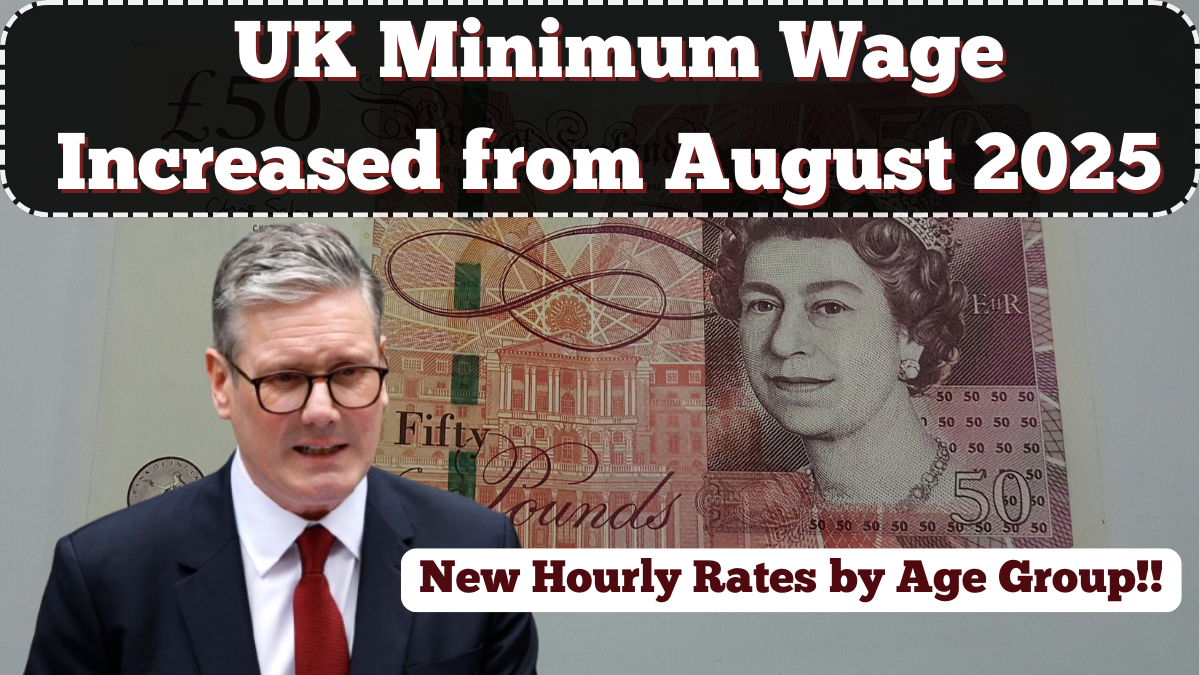The UK Minimum Wage Increase officially comes into effect from August 1, 2025, giving a much-needed boost to workers across various age groups. The UK government has announced new minimum wage rates as part of its UK wage hike 2025 initiative aimed at improving living standards and narrowing income inequality. This change directly impacts workers aged 16 to 23, apprentices, and those on the National Living Wage.
This latest employment update ensures higher earnings for millions of workers across the UK, especially the youth and part-time employees who have long awaited fair pay for their efforts. Employers are now legally required to adjust wages in accordance with the revised hourly rates.
The pay rise reflects the government’s commitment to help workers cope with inflation while reducing the gender and regional wage gaps that persist in the UK job market.

New hourly rates effective August 2025
Here’s a complete breakdown of the new UK Minimum Wage Increase rates:
| Age/Group | Previous Rate (2024) | New Rate (August 2025) |
|---|---|---|
| National Living Wage (23+) | £10.42 | £11.10 |
| 21–22 years old | £10.18 | £10.80 |
| 18–20 years old | £7.49 | £8.25 |
| 16–17 years old | £5.28 | £6.10 |
| Apprentices | £5.28 | £6.00 |
These new rates were recommended by the Low Pay Commission and are now legally binding. The UK wage hike 2025 applies across England, Wales, Scotland, and Northern Ireland.
Why this wage hike matters
The UK Minimum Wage Increase is more than just a number change. It ensures young workers and apprentices get a fairer share for their contributions in the workforce. The updated wages are designed to:
-
Improve financial stability for young workers
-
Narrow the gap between apprentice and full-time employee pay
-
Support the overall cost of living amid economic challenges
-
Encourage businesses to improve productivity and staff retention
This employment update comes at a time when inflation and rental costs are rising across urban and rural areas, making the pay rise a welcome relief.
What employers need to know
With the new rates effective from August 2025, all employers must comply with the UK Minimum Wage Increase or face penalties. The government has enhanced its wage inspection framework and encourages workers to report non-compliance anonymously.
Employers are expected to:
-
Audit payroll systems before August 1
-
Adjust hourly rates for all impacted employees
-
Inform staff in writing about the new rates
-
Maintain updated wage records for audits
Failing to implement the UK wage hike 2025 could result in legal fines, public naming, and damage to business reputation.
Impact across industries
Sectors like retail, hospitality, and healthcare—where youth and part-time workers dominate—will see the most direct effects of the UK Minimum Wage Increase. Employers in these sectors will need to revise their budgeting and hiring strategies to accommodate the new wage structure.
Meanwhile, workers in these sectors will benefit significantly from the pay rise, gaining more income security and better purchasing power. In regions like the North East and Midlands, where minimum wage jobs are prevalent, the policy is expected to bring noticeable economic improvement.
FAQs
What is the UK Minimum Wage Increase from August 2025?
The UK Minimum Wage Increase refers to the revised hourly pay rates for different age groups and apprentices that come into effect on August 1, 2025.
Who is affected by the new wage hike?
The UK wage hike 2025 affects workers aged 16 to 23, apprentices, and those on the National Living Wage (23+). Employers in all sectors are required to comply.
What is the new rate for the National Living Wage?
The new pay rise brings the National Living Wage up to £11.10 per hour for workers aged 23 and above.
Will apprentices get a new minimum wage?
Yes, under the UK Minimum Wage Increase, apprentices will now earn £6.00 per hour, up from £5.28 in 2024.
What happens if an employer fails to comply?
Employers who fail to implement the UK wage hike 2025 could face fines, legal action, and may be publicly listed as non-compliant by HMRC.
Click here to know more.
